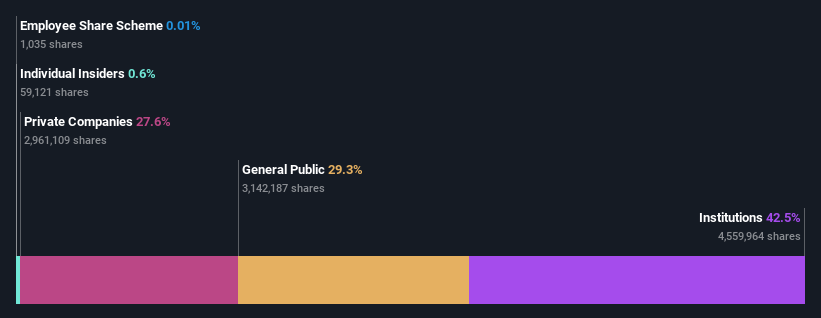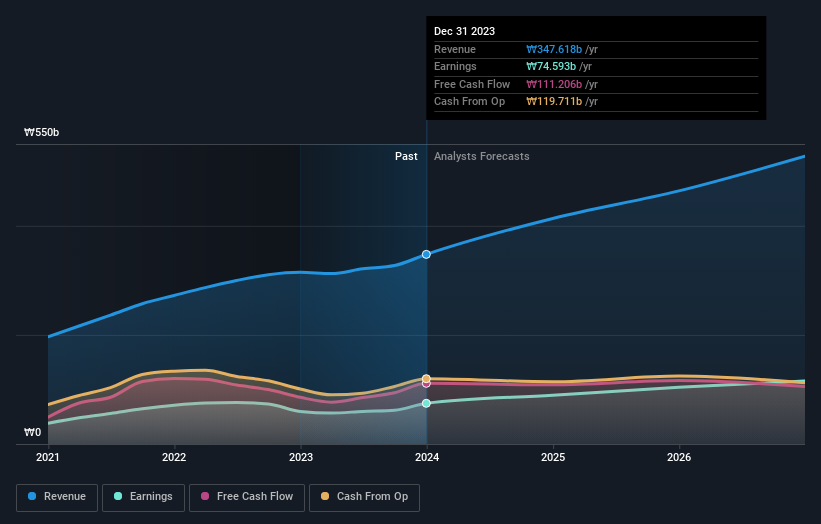Stock Analysis
- South Korea
- /
- Interactive Media and Services
- /
- KOSDAQ:A067160
Soop Co., Ltd.'s (KOSDAQ:067160) high institutional ownership speaks for itself as stock continues to impress, up 6.3% over last week

Key Insights
- Given the large stake in the stock by institutions, Soop's stock price might be vulnerable to their trading decisions
- 50% of the business is held by the top 5 shareholders
- Ownership research along with analyst forecasts data help provide a good understanding of opportunities in a stock
To get a sense of who is truly in control of Soop Co., Ltd. (KOSDAQ:067160), it is important to understand the ownership structure of the business. We can see that institutions own the lion's share in the company with 43% ownership. That is, the group stands to benefit the most if the stock rises (or lose the most if there is a downturn).
And last week, institutional investors ended up benefitting the most after the company hit ₩1.3t in market cap. The gains from last week would have further boosted the one-year return to shareholders which currently stand at 66%.
Let's delve deeper into each type of owner of Soop, beginning with the chart below.
See our latest analysis for Soop

What Does The Institutional Ownership Tell Us About Soop?
Many institutions measure their performance against an index that approximates the local market. So they usually pay more attention to companies that are included in major indices.
As you can see, institutional investors have a fair amount of stake in Soop. This suggests some credibility amongst professional investors. But we can't rely on that fact alone since institutions make bad investments sometimes, just like everyone does. It is not uncommon to see a big share price drop if two large institutional investors try to sell out of a stock at the same time. So it is worth checking the past earnings trajectory of Soop, (below). Of course, keep in mind that there are other factors to consider, too.

We note that hedge funds don't have a meaningful investment in Soop. The company's largest shareholder is Saint International Co. Ltd, with ownership of 28%. In comparison, the second and third largest shareholders hold about 7.9% and 5.5% of the stock.
To make our study more interesting, we found that the top 5 shareholders control more than half of the company which implies that this group has considerable sway over the company's decision-making.
While it makes sense to study institutional ownership data for a company, it also makes sense to study analyst sentiments to know which way the wind is blowing. There are a reasonable number of analysts covering the stock, so it might be useful to find out their aggregate view on the future.
Insider Ownership Of Soop
The definition of company insiders can be subjective and does vary between jurisdictions. Our data reflects individual insiders, capturing board members at the very least. The company management answer to the board and the latter should represent the interests of shareholders. Notably, sometimes top-level managers are on the board themselves.
Most consider insider ownership a positive because it can indicate the board is well aligned with other shareholders. However, on some occasions too much power is concentrated within this group.
Our data suggests that insiders own under 1% of Soop Co., Ltd. in their own names. But they may have an indirect interest through a corporate structure that we haven't picked up on. It has a market capitalization of just ₩1.3t, and the board has only ₩7.1b worth of shares in their own names. Many tend to prefer to see a board with bigger shareholdings. A good next step might be to take a look at this free summary of insider buying and selling.
General Public Ownership
The general public-- including retail investors -- own 29% stake in the company, and hence can't easily be ignored. While this size of ownership may not be enough to sway a policy decision in their favour, they can still make a collective impact on company policies.
Private Company Ownership
We can see that Private Companies own 28%, of the shares on issue. It's hard to draw any conclusions from this fact alone, so its worth looking into who owns those private companies. Sometimes insiders or other related parties have an interest in shares in a public company through a separate private company.
Next Steps:
It's always worth thinking about the different groups who own shares in a company. But to understand Soop better, we need to consider many other factors.
I always like to check for a history of revenue growth. You can too, by accessing this free chart of historic revenue and earnings in this detailed graph.
But ultimately it is the future, not the past, that will determine how well the owners of this business will do. Therefore we think it advisable to take a look at this free report showing whether analysts are predicting a brighter future.
NB: Figures in this article are calculated using data from the last twelve months, which refer to the 12-month period ending on the last date of the month the financial statement is dated. This may not be consistent with full year annual report figures.
Valuation is complex, but we're helping make it simple.
Find out whether Soop is potentially over or undervalued by checking out our comprehensive analysis, which includes fair value estimates, risks and warnings, dividends, insider transactions and financial health.
View the Free AnalysisHave feedback on this article? Concerned about the content? Get in touch with us directly. Alternatively, email editorial-team (at) simplywallst.com.
This article by Simply Wall St is general in nature. We provide commentary based on historical data and analyst forecasts only using an unbiased methodology and our articles are not intended to be financial advice. It does not constitute a recommendation to buy or sell any stock, and does not take account of your objectives, or your financial situation. We aim to bring you long-term focused analysis driven by fundamental data. Note that our analysis may not factor in the latest price-sensitive company announcements or qualitative material. Simply Wall St has no position in any stocks mentioned.
About KOSDAQ:A067160
Soop
Soop Co., Ltd., together with its subsidiaries, operates as an entertainment company in South Korea.
Very undervalued with outstanding track record.

